History is a subject that many adored in school. Studying the past can change our perspective and explain why things happened the way they did. And learning fun tidbits like how Cleopatra’s beauty was out of this world or that Napoleon was extremely short made it even more intriguing, right?
Well, none of them are true. Yet, we repeat them so many times, we start thinking that they are. Redditor sad-talking_head wanted to know "What are some historical lies that people generally believe?" and hundreds of people rolled up their sleeves, revealing the truth behind the biggest fibs that are widely accepted to this day.
Some of the responses we selected will remind you to look at things with a pinch of salt. So upvote your favorite ones and be sure to let us know what you think in the comments below!
#1
Ok so, we have known for YEARS that Greco-Roman statues and buildings were painted rather than them being just plain white marble, but we actively ignored it.So when people found old Greco-Roman statues they did notice staining from paint on some statues but ignored it because white marble was so beautiful and by the renaissance was pretty much a symbol or Rome and thus, civilisation. Early art historians basically said "they were meant to be white because white bare marble was more beautiful" DESPITE EVIDENCE OF PAINT. When statues were found from Ancient Greece and Rome the remaining paint was washed off and even the Parthenon had obvious evidence of paint on it up until the 18th century. Even historical texts from the time talk about painted buildings and the discovery of Pompeii showed a Roman empire that was much more colourful than people wanted to admit.
So fast forward to the late 20th century when, after admitting amongst themselves that statues were likely painted announced to the world in a big way that yeah, the statues were painted. A Museum made a replica of Augustus of Prima Porta which they painted to the best evidence they had and the public hated it, with one art critic comparing it to a drag queen. Even when faced with the truth, people didn't merely reject it, they went against it. It got so bad that White nationalists sent death threats to art historians for stating that Greco-Roman statues were pained bright colours because it went against their image of ancient European civilisation.
So yeah. Palaeontologists might get flack for feathered Dinosaurs but at least they don't get death threats from White nationalists.
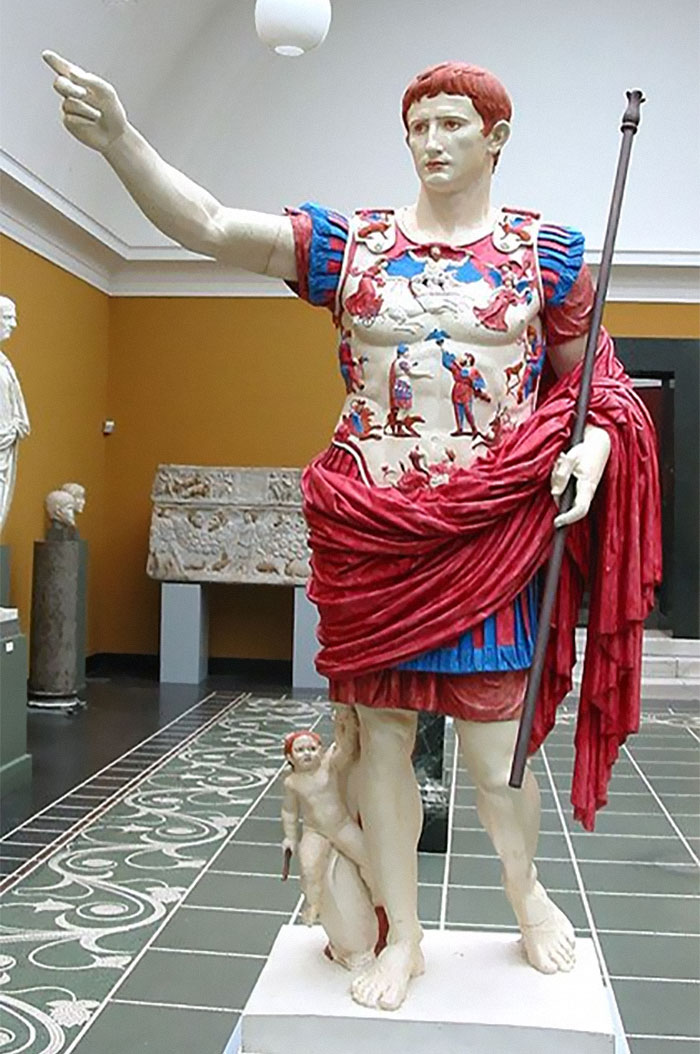
Image credits: OhHiGCHQ
#2
"NASA spent millions on developing a pen for space. The Russians used a pencil." [suggesting NASA isn't very intelligent]They were perfectly correct to make a pen for space. A pencil would have released loads of tiny graphite particles during use, which would float around and interfere with electronics.

Image credits: wombey12
To learn more about common historical misconceptions, we reached out to Otto English, who recently published a book called Fake History: Ten Great Lies and How They Shaped the World. Otto English is the pen name of London-based author Andrew Scott. According to him, our textbooks are filled with little falsehoods.
"While academic history books tend (for the most part) nowadays to be very well researched, a lot of the 'general histories' that kids used to get brought up on (across the world) were littered with lies, bigger lies, and big fat whoppers," he told Bored Panda. "Some of those untruths are now so deeply embedded in the collective consciousness of nations that they have gained a general currency and are almost impossible to shift."
English explained that many people do believe "that when Columbus sailed to America in 1492, his sailors and indeed most Europeans thought the world was flat," which is completely untrue. "The Greek polymath Eratosthenes had worked out that the world was a globe as far back as 200 BCE! Nobody was in fear of falling off the edge of a flat planet in the 15th century."
#3
That nobody would fund Christopher Columbus' voyage because they thought the world was flat. In 1492 people had known that the Earth was round for quite some time, and we actually had a very accurate estimate of how big it was. In fact there's some evidence that the reluctance to fund Columbus' voyage was because that most assumed you couldn't get to India by going west because, given the estimate of the Earth's size, there was probably a landmass in the way.
Image credits: theclash06013
#4
My favorite lie is Ultra.It's not really just one lie. It's a campaign of lies, probably more widespread and deep-routed than any in history, all leading to one collossal lie: Hiding the fact that the Allies broke the Enigma cipher. And, later, the Japanese "Purple" cipher, and the German Lorenz cipher, and the Italian C-38 cypher.
Basically, the Allies had blown every code the Axis used out of the water, thanks to the work of the Polish Cipher Bureau, and the Bletchley Park mathematicians including Alan Turing, and the American Signal Intelligence Service.
The collective intelligence from all these broken codes was called Ultra.
But what do you do when your code gets broken? You make a new, harder one. The allies couldn't let that happen, they couldn't let the axis know that their codes were broken. So how do you use data from a broken code without revealing that the code is broken? You lie. If they wanted to take out an Axis supply ship after finding it through Ultra, they didn't just do that. They had a spy plane fly over where they knew the ship would be, then they sunk it. So the crew are all like "oh s**t we got spotted." They also had to hide the broken codes from their own soldiers, lest they be revealed under careless talk. So they sent out other spy planes knowing nothing would be found, so crews wouldn't wonder how mission found an enemy every time.
They would never attack until they had a "cover story". Men undoubtedly died, by attacks the government knew were coming, because they would not compromise Ultra.
One of the few times they were forced to sink ships immediately, they covered it by sending a message in a code they knew the Germans had broken, to a spy in Naples, congratulating him of his success. The spy didn't exist, but the Germans intercepted the message and assumed everything was still good with Enigma.
The best part is, they didn't even reveal Ultra after the war. They saw to it that the Enigma machines were sold to potential enemies in the Third World, who continued to use the broken codes for years. Ultra wasn't revealed in its full extent until 1974, 29 years after the war. Never has a secret of such massive importance been so well kept for so long.
So why did so many think otherwise? The journalist revealed that the explanation behind this could be "a very dodgy biography of Columbus written by US author Washington Irving in the early 19th century. He was forging a sort of national myth of early America with Columbus at its center and that's one very big reason why in the past, fake history was made."
"People are drawn to 'good stories' that shine a good light on them, and these fairy tales of our past are a sort of glue that binds nations together," English said. The more important and relevant the event is, the more likely it is that people will use it for their benefit. "Unfortunately, a lot of those stories have been weaponized over time which makes them very dangerous indeed."
While it’s impossible to tell exactly how much of our history is bent, one thing the author found while writing his book was that "a whole lot of stuff we take for granted is just plain wrong."
#5
Almost anything involving the Library of Alexandria.No, the Library of Alexandria was not the sole repository of knowledge in the ancient world. There were many other great libraries such as the one in Pergamum as well as many, many other collections.
No, we did not lose countless important works that could only be found there. The Library worked on copying works, and any important writings could easily be found in other libraries around the world.
No, we wouldn't be living in a utopia if it didn't burn because it was the centre of learning. The Library was in serious decline for almost a century before it burned. When Ptolemy VIII banned all foreign scholars from Alexandria, they moved to other libraries, and as Ptolemaic rule became less stable and the position of head librarian became a political position the prestige of the Library faded.
No, Julius Caesar did not burn it down on purpose. While he was besieged in Alexandria his troops set fire to some ships on the docks and the fire accidentally spread. However, it is unsure of how much of the Library was truly destroyed, as we know the Mouseion survived, and at any rate we know much was rebuilt later, with Mark Antony supposedly gifting some 200,000 scrolls to the Library, and Claudius built an additional to it during his reign.
No, the Christian Crusaders did not burn down the Library because they hated knowledge. First of all they didn't even attack Alexandria during the major Crusades (they would during a later minor one) besides they would be almost a 1000 years too late, as the last recorded evidence of the Library dates back to the middle of the 3rd Century, and any vestiges of the Library, which would have been a minor shell of its hight as Roman and Greek scholarship had long moved to other centres. At any rate what remained would have been destroyed during either Aurilian's attack of the city in 272 CE or Diocletian's in 297 CE.
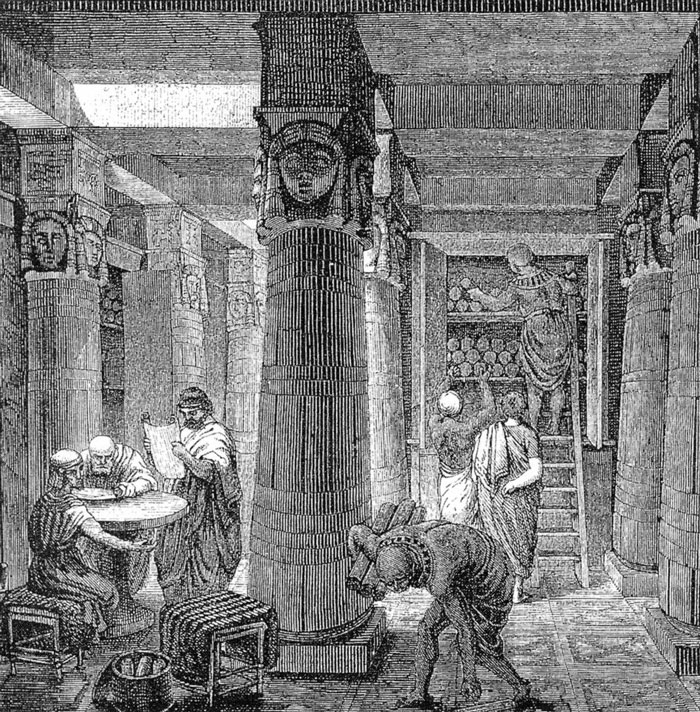
Image credits: badcgi
#6
That the Tiananmen Square massacre never happened. I studied in China and my teachers there gave me this watered-down, oversimplified story of what they were told as youngsters. You can't even find that section on Wikipedia when in China. Censorship is real.
Image credits: jace829
#7
I still hear that a lot of people believe the pyramids were built by slaves. They were not, they were paid workers. They even had benefits like bonuses and health care and the more skilled workers were allowed days off. (In ancient Egypt they had four categories that all careers fell into which are: manual work, administration, priesthood, military service.)
Image credits: FrostyEnthusiasm
"In the UK, for example, millions of people completely misunderstand key events in WW2 and Britain's part in it," he added. "Most British people have grown up with a narrative in which 'Little Britain' stood alone against the Nazis and that we were nearly invaded in 1940. That narrative ignores the fact that our navy was twice the size of theirs, and that Britain was the master of an enormous empire that could pull on vast resources of men and materials."
English continued: "Also, Churchill has been raised up to the point of deification in the UK. To question his role in events or to doubt that he is our greatest Briton has become a sort of test of how patriotic you are. This is a very narrow way of defining loyalty to the group."
#8
That Napoleon was short, he was of average height by those times. French just used the different scale of measurement.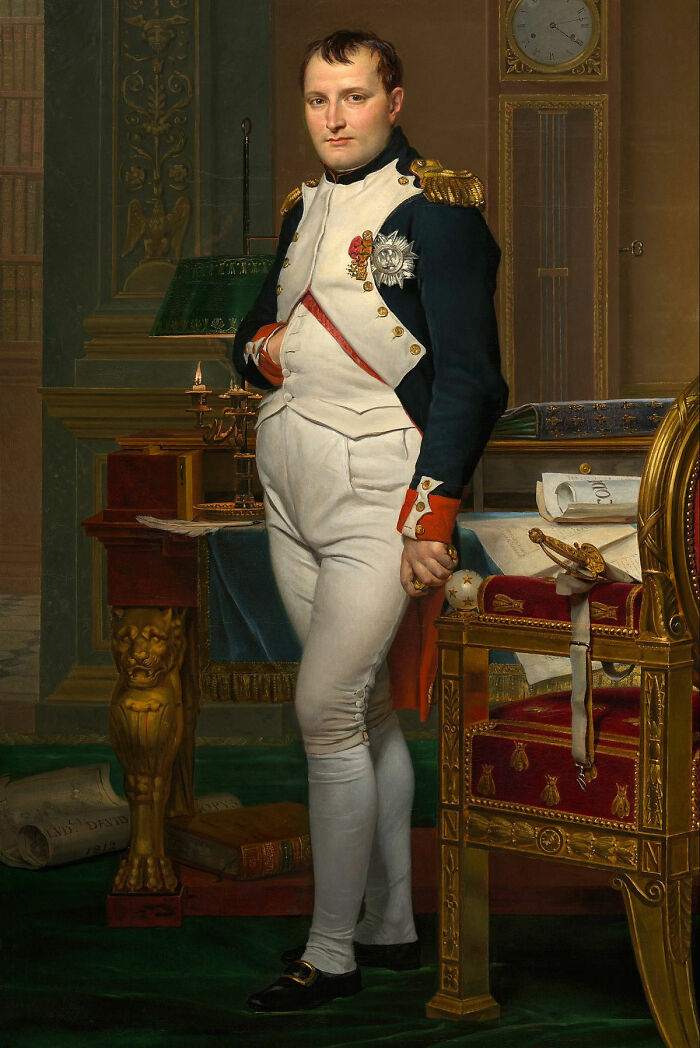
Image credits: [deleted]
#9
That corsets were uncomfortable for women and they moved organs and made women faint. Women wore corsets for hundreds of years, they were the precursor to the bra. They were for support, they were not solidly boned, they were actually quite flexible. All women wore them, high ladies of society, working women, old women, young women. They can actually be quite comfortable. The myths that most people know stem from very high ladies of fashion. Corsetry and tight lacing are two different things. Most women did not have 18in waists. Just like today, the women that were placed in ads are skinny and unattainable. People were not shaped differently.
Image credits: emomusicfreak
#10
That the Roman Empire fell in 476 AD and then it was the dark ages.In reality, a peasant living through 476 probably wouldn't have realized they were living through the end of one age and the start of another. The beginnings of feudalism had already started back during Diocletian's reign, barbarians warbands and barbarian roman troops had been a fact of life for generations. The barbarian king who deposed Augustulus still considered himself a rightful representative of the Empire, etc. In some ways, the fall of Rome was sudden and traumatic (the population of Rome itself absolutely cratered in the 400's, after all), but it was really more of a gradual, centuries long transition than a fall.

Image credits: bigblindmax
Another generally accepted idea in the UK is "that 'we' got through the war because British people had a special 'Blitz spirit'. Politicians propagate this wartime propaganda as if it's an actual thing—and millions of people believe it." After all, repeat a lie a thousand times and people will think that it’s true. The author explained that "exceptionalism" is the belief that your people and nation are better than everyone else's, and, unfortunately, it is "very far from unique to the UK."
Plenty of people believe in false facts and bogus theories without understanding they are incorrect. Otto English mentioned that if you "get the past wrong, you get your present wrong too", so it is essential to find the truth behind such historical lies.
#11
The Pilgrims came to America for religious freedom and to avoid persecution.Half-truth, at best - they wanted the freedom to apply their religious more stringently - sort of an English Taliban. They were hounded out of England and weirded out of the Netherlands because of their puritanical practices - hence the derogatory Puritan label.
They wanted to establish a community in what is now the US to be LESS tolerant than the communities they had in Europe.
So - did they come for religious "freedom?" Yeah, kinda - as long as it was their religion, specifically. They definitely did not come in the spirit of "all religions should be treated equally," which is how this usually gets glossed over in US schools.
#12
That Cleopatra was some sort of otherworldly beauty who mesmerized every man she met. Ancient historians were more impressed/scandalized by her intelligence and ability to manipulate as easily as she breathed, and it wasn't until centuries later than she began to develop this reputation as a sexy seductress. Cleopatra's ancestors were big fans of incest (the sixteen roles of her great-great-grandparents were filled by just six individuals), and members of the Ptolemaic dynasty had a reputation for being...odd-looking. Cleopatra, reportedly, was above-average-looking compared to others in her family, but according to historians like Plutarch, the general consensus was that “her beauty… was in itself not altogether incomparable, nor such as to strike those who saw her.”
Image credits: Dahhhkness
#13
Gillette invented the idea of women shaving their pits and legs and no one removed body hair before then. (Yet they never acknowledge things like sugaring, waxing, plucking, and threading that goes back hundreds of years.)Hair removal goes all the way back to our caveman days. Our ancestors of all genders removed body, facial, and even head hair during warmer months using sharpened stones and shells, pitch from trees to rip it out at the roots, or rubbing it off with pumice stones or handfuls of sand. This prevented parasite infestations and skin infections.
In the Renaissance European women plucked their eyebrows and hair along the forehead to make their foreheads appear bigger so people would think they had larger brains and therefore were smarter.
Victorians wanted to "be as pure as marble statues" which meant removing ALL body hair. So yes, all genders of middle and upper class Victorians went full Brazilian.
So all Gillette do was make it easier to remove your body hair. They didn't invent it.
"Many Britons see themselves as the heroes of the saga of history and thus disregard our terrible and critical role in slavery and Empire building," he noted. "How nations see themselves in the present is inexorably linked to their collective view of their history."
The author continued by telling us that history is the mountain stream that feeds modern politics: "Nationalism is a growing problem across the world—from Russia to the USA, from China to Britain. A lot of the thinking in those countries is propped up on fake history and an exaggerated sense of their past achievements."
#14
The Old World was more civilized than the New World. Just as the Aztecs were sacrificing humans to their gods, Christians were burning people at the stake for being witches, inserting expandable eggs into orifices for not being Catholic enough, and committing atrocities simply because a city followed Islam. We're all sick bastards.#15
That the Confederacy was fighting for "states rights." Their leaders said they were fighting to preserve slavery. And they wrote it into their own government documents. We should take those traitors at their word.#16
People today live twice as long, on average, as people half a century ago. It was 33 in the middle ages and over 65 today.While technically true, it's not because people live twice as long.
It's because less infants die. Without all the 0's factored in, the average has risen, even though people live roughly the same amount of time.
Factor out infant mortality, and the increase is relatively minor, more like 60 vs 65.
#17
That Edison was the one who invented the lightbulb but rather he just bought the blueprints from two men that I don’t remember the names of and then paid fifty people to finish it and took all the credit. Also the fact that he’s the one that we owe for many current inventions which were invited by Nikola Tesla. Mostly Edison was known as an inventor while in reality he was just a good business man who took all the opportunities that he could which some later on came back to bite his a** ( invention of the electric chair, and the experiments used to prove Tesla’s AC was dangerous so people would continue to use his DC system )So if you start to feel worried and wonder whether you need to rethink your education, remember that you have a powerful fact-checking device right there in your pocket. "At your fingertips, you have more ability to check and check again than any of your ancestors," English said.
He added that if you fall for misinformation and lies in 2022, you can only blame yourself. Don’t get played "like a pawn in the global chess game" and "use that device to fight back and make sure that what you are being told is true. There are reliable histories and fabulous fact-checking websites like Snopes out there all just one click away—so there's no excuse to get conned."
#18
That humanity happily left the struggles of hunting and gathering to gratefully pick up sedentary agriculture.Historical evidence suggests early states had to constantly round up farmers who decided that agriculture sucked and fled to be seminomadic or nomadic pastoralists and hunters. Thus early war's focus on taking slaves, which usually were resettled closer to state centers and integrated culturally. Agriculture was forced on most of humanity, not picked up as an improvement.
Plenty of evidence also suggests that agriculture was much less energy efficient and ensured poor nutrition. Nomadic barbarians were often larger and healthier than antiquity farmers. Some anthropologists even think sedentary agriculture was a last ditch survival tool taken up during a climatological cataclysm and not seen as some technological progression by early humans.
Neat stuff.

Image credits: Peggedbyapirate
#19
That Marie Antoniette proclaimed "Let them eat cake." In reality it seems to have emerged from a short anecdote in an autobiography published by french (edit: Genevan born) philosopher Jean-Jacques Rosseau and is frequently misattributed to her.#20
People believe the Catholic Church was routinely anti-science.In reality the church sponsored an lot of science. For example the big bang theory was the product of a Catholic priest and encountered atheist resistance because they thought it sounded too much like creation.
"People believe in historical facts that are not true when those facts support their worldview," history teacher Rebecca Brenner Graham, Ph.D. told Bored Panda. "For example, if they want to ignore America's legacy of racism, they might insist that the Civil War was not about slavery, though the Articles of Secession leave no room for doubt that the Confederacy aimed primarily to protect slavery."
According to her, the truth behind historical facts matters because history has real power. "For example, too many Americans today insist that enslaving an entire Black population was only a sideshow in early American history, though in reality, it was foundational," she explained. Failing to observe "the horrors and traumas of American slavery causes too many people to overlook the legacies of slavery, like mass incarceration and police brutality today."
#21
That knights in plate mail were big, slow, clunky bruisers. In reality plate armor is actually easier to move around in than what we think of in video games as medium armor like chainmail. Why? Because its fitted to the wearer and held on with a complex collection of straps and belts. This distributes the weight evenly across the body. In comparison to chain mail (or samurai o-yoroi which often comes up when this is mentioned), this is far more comfortable as the others put weight straight on the arms and shoulders.In a similar vein, padded or cloth armor is often portrayed in games as the lowest form of protection but a properly made gamberson of such is actually surprisingly good protection. The layers of tough textile, often stitched so the weave is going in different directions each layer, actually can really stagger a slashing blow.
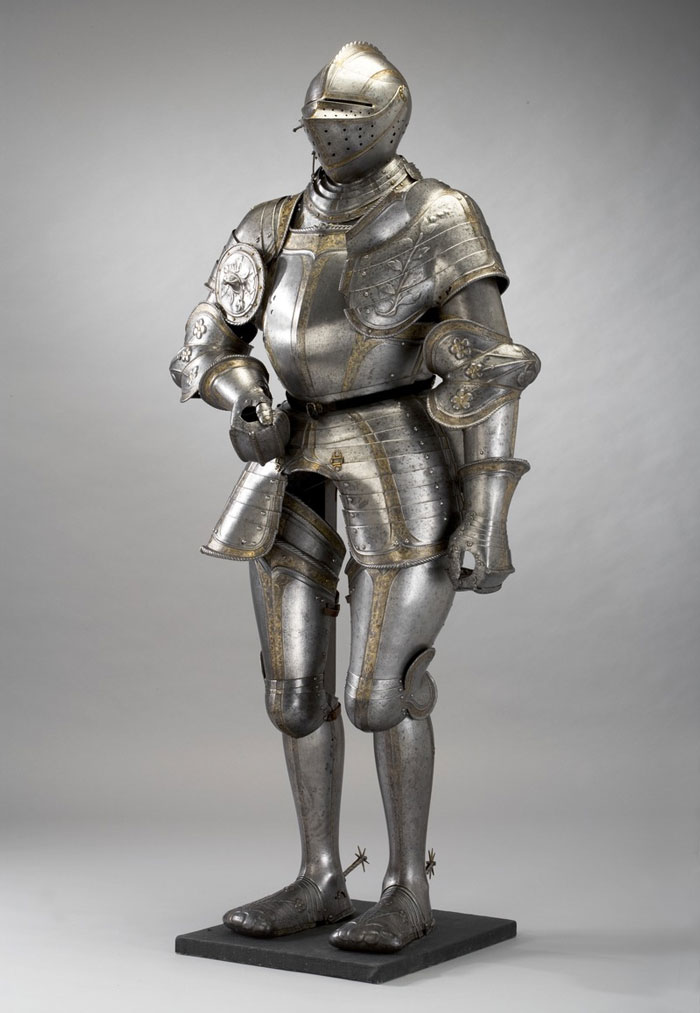
Image credits: SumsuchUser
#22
The Romans only briefly held Britain, they had occupied it longer than the USA has been a country.
Image credits: chattywww
#23
Hitler didn’t become a monster because he was kicked out of art school.He was a neckbeard bouncing around Vienna filling his head with all sorts of bulls**t “philosophy” and well on his way to becoming a monster when someone suggested that he look into an art and architecture program at some school. He made a half-a**ed application which was denied and he continued to sell little paintings to get by while he read all his crazy books. He trumped up the kicked out of art school story in Mein Kampf.

Image credits: Thirty_Helens_Agree
If you have any doubts, Graham advised you to stick to the primary sources. "Archival documents, letters, political cartoons, speeches, and many more sources serve as evidence. As secondary sources interpret the past based on primary sources, they should cite them." As readers, we need to check how the author supports their points.
"At the same time, listen to people from marginalized communities about their family histories. Oral traditions can help to fill holes in the source base," she concluded.
#24
People believe, that the ex soviet union nations liked the soviet union and wanted to be annexed. the soviets treated the ex soviet countries badly. deportings every day. freedom of speech doesnt exist. you couldnt even show your countrys original flag.
Image credits: TomatoHeadyBoys
#25
That the Nazi medical experiments/Japanese Unit 731 discovered anything of worth for modern medicine.The medical experiments conducted during the Holocaust weren't out to test or prove any hypothesis other than "Germans are better". Almost every experiment involved killing prisoners in some convoluted way such as freezing in a tub of ice water, shocked with electricity until they died, or some other form of execution. The time it took for the prisoner, an emaciated, physically weak person to die and simply stated that it took a healthy, fit, normal German man longer to freeze to death and thus Germans were physically superior. In the end, it was just plain old murder wearing a scientist's labcoat.

Image credits: quiaudetvincet
#26
I was taught some 16-20 years ago that pretty much all slaves liked their owners, liked serving them, thought they got a good deal, etc. We were also told that "most of the ones that came here did so voluntarily"
Image credits: drunky_crowette
#27
That Iceland was named Iceland by the vikings to try to try to trick colonists into not colonizing when in fact the reason is that when the first people landed on iceland it was winter and the viking that named it saw a lot of ice and promptly named it as such#28
Salieri and Mozart actually got along quite well. If they did have a rivalry, it was merely professional.Salieri didn't promise his chastity to god, or if he did he didn't follow through because he got married and had kids.
Salieri didn't have to manipulate the emperor to earn favour with him. He was a well respected composer, and one of the richest men in the country at the time.
Amadeus is a great film, but it's a good thing that it doesn't start with "based on a true story". At least it's honest... I'm looking at you Braveheart!
#29
That Ancient Greeks and Romans were super gay, or super OK with homosexuality.The first and most important point is that they did not conceive of sexuality in any way similar to how we do. They didn't think of it as defined strictly, or even most importantly, along gender lines. They viewed sexuality in terms of dominant and submissive, or, more crassly, the one doing the f**king and the one being f**ked. This was also heavily tied to their public life and roles, as well. It was normal for men to sleep with other men, so long as the older man in a position of authority over the other man was the dominant partner in the relationship. For example, if a Senator had a relationship with a young assistant, or a general had a relationship with a lieutenant, that would not be seen as scandalous. However, if the roles were reversed, say the lieutenant were the one penetrating the general, that would be incredibly scandalous.
Another thing to add on to this is that these were incredibly misogynistic cultures. So while it was normal for two men to be in a sexual relationship (under the conditions I described above), women were always the submissive partner in a sexual relationship. It was incredibly scandalous for two women to sleep together because that would be two submissive partners.
Finally, sexual relationships and marriage were not quite as connected as we see them today. Sure, technically, you weren't supposed to have sex with anyone other than your spouse, but men quite regularly slept with many partners of both genders without much controversy. Men would have sexual relationships with both men and women outside their marriage. You were supposed to be discrete with your dalliances, and not carry on long term relationships with someone else when you were married, but that, too, was regularly ignored. Again, though, touching back on the misogyny, if a woman were to cheat on her husband that would be grounds for divorce. Marriage was always between a man and a woman. So even if a man had a relationship with another man, marriage between two men (or two women for that matter) was just incompatible with how they thought about marriage. That's not to say there weren't examples of men having long-term permanent romantic relationships with other men, just that they would never have considered marriage as a possibility or something they wanted.
Now there were certainly people we would consider homosexual. The 2nd century Roman Emperor Hadrian, for example, was absolutely a homosexual. He had a long term romantic and sexual relationship with a man (much younger than him, by the way). He had a wife, but that was more for political and public image reasons than anything romantic or sexual. They had no children, and the ancient sources even suggest they never even had sex. The only thing that was notable about Hadrian's sexuality in his time is how public he was about carrying on a sexual relationship with someone other than his wife.
#30
That Henry VIII divorced his fourth wife Anne of Cleves because she was 'ugly', or that he was deceived by a flattering portrait only to be disappointed in real life. When Anne first arrived in England, Henry thought it would be romantic to disguise himself when meeting her for the first time, so when he attempted to kiss her she had no idea it was the King, so she pulled away stunned and frightened. Henry's ideas of a chivalric first meeting ended in humiliation, so he would have taken an instant dislike to her for damaging his ego. Also, there is no evidence to suggest that Holbein's portrait of Anne was not a true likeness. Holbein's talents continued to be praised throughout Henry's reign. It is more likely that he was trying to cover up his embarrassment at their disastrous first meeting, by stating that she was not what he expected, or that he was convinced she wasn't a virgin.#31
That Anne Boleyn had six fingers. She would have never been a lady in waiting to Catherine of Aragon, or even a mistress to Henry if she did, as it would be considered an imperfection. Most of it was made up after she was executed.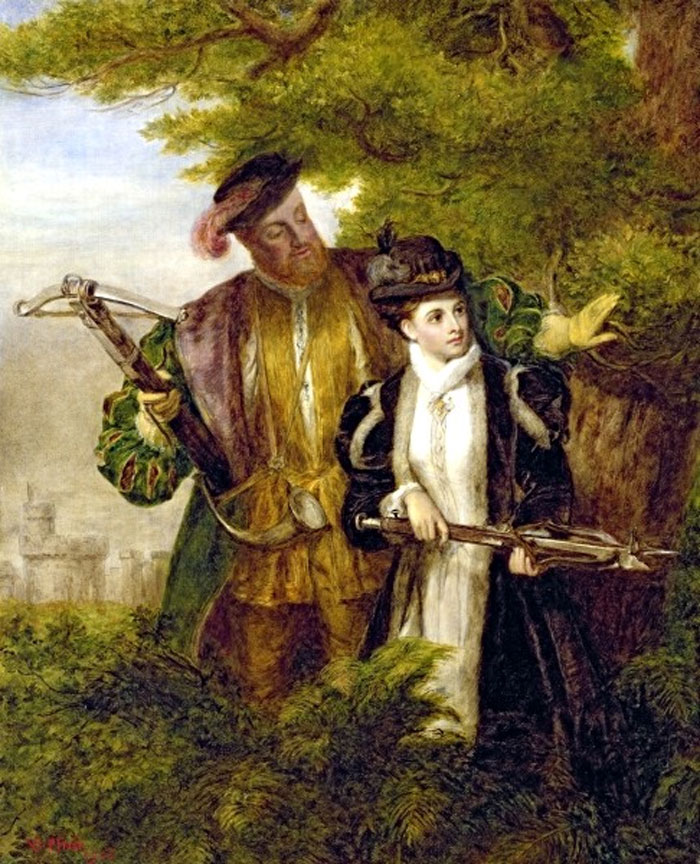
Image credits: 90sthingz
#32
The myth that Titanic was in any way badly designed, badly built, or badly operated - by the standards of the time. In fact there are so many crazy inaccuracies surrounding Titanic that it's hard to list them all here... But I'll give it a go!She was an incredibly seaworthy ship - probably moreso than any passenger ship around today. The iceberg damage stretched almost a third of the way down her side, and she still stayed afloat for more than two hours!
In that time, all but two of her lifeboats were launched - there wasn't time to launch any more. She could have had a hundred more lifeboats on board, but that wouldn't have helped without vastly more crew to operate them.
Titanic's passengers genuinely did believe that she was practically unsinkable. When the time came to begin loading the lifeboats, many thought they would be safer staying on Titanic. There wasn't time for the crew to wait around convincing more people to get in, so when a lifeboat was ready, if there was no-one else waiting to get in, it had to go. This is why so many of Titanic's lifeboats left only half-full - it's not just because the crew were worried about over-filling them.
Titanic wasn't travelling too fast for the conditions - by the standards of practice around at the time. Further precautions were put into practice after the incident, but no-one on board can be blamed for doing what anyone on any ship would have done the same.
Titanic was by no means a fast ship, nor was she ever intended to be. The White Star Line (Titanic's owners) were in competition with one other big shipping line, Cunard. Cunard's liners (Mauretania, Lusitania and later Aquatania) were the fastest in the business. To combat this, instead of fighting for speed, White Star decided to try to make their liners the most luxurious in the world. Olympic and Titanic were famed for their splendour and comfort - passengers said that it was easy to forget that you were at sea, as there were very few vibrations from the engines, and the ships remained stable even in fairly rough seas. By comparison, Cunard's liners were very fast, but their quadruple-screw configuration made vibration more apparent. It's a myth that Titanic was ever trying to make record-breaking speed across the Atlantic.
She wasn't built using sub-standard materials. This rumour goes around a lot these days because of an article that was written some time ago; what the article is supposed to mean is that there is much better quality steel available today. This was not the case in 1909. Additionally, Titanic's builders were paid on a fee plus materials basis - they were given a set fee to construct the ship, plus the cost of all materials used. There was no incentive to use anything but the best steel they could get their hands on. The shipyard had an excellent reputation and would not risk tainting it by using bad steel, which could easily be noticed on inspection anyway.
Titanic and her two sister ships Olympic and Britannic were also surprisingly manoeuvrable for their size - much moreso than was expected. Some will tell you that Titanic's rudder was too small, but this simply isn't true. In fact, Olympic's wartime captain marvelled at her manoeuvrability, and was even able to throw her into a sudden turn, ramming (and sinking) a German U-boat. Olympic was the first of only two merchant vessels throughout the First World War recorded to have sunk an enemy vessel.
While it's true that the lookouts' binoculars were misplaced (or rather, locked away in a cabinet that no-one on board had the key to open), this made no difference to Titanic's fate. The images of sea captains and pirates scanning the horizon through telescopes, while common in films, has virtually no stead in reality. Binoculars and telescopes narrow your field of vision down to a fine point, making it harder to spot anything. Lookouts on real ships will use their eyes alone to search for objects of interest, and once they've been spotted, will u
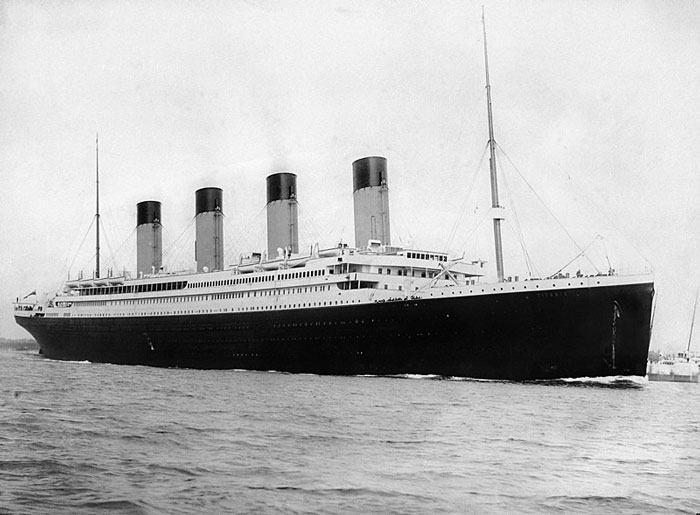
Image credits: DarkNinjaPenguin
#33
Poland actually did fairly well for itself at the onset of WWII considering it was invaded by both the Soviets and the Germans. The initial resistance gave the Germans pause.Also, the Polish did not charge at German Panzers with horses and lances.
#34
That King Arthur was an English hero.At the time of the legends, the Isles were horrifically divided between Romanized Britons, Saxon mercenaries, and Picts. The legends always place Arthur as the victorious hero against the Saxons. But in reality, the Saxons (Anglo-Saxons) not only won, they drove those Britons who didn’t settle peacefully from what we consider modern England. The Anglo-Saxon’s would blend with Danes and Norsemen, and then with the French Normans after that.
The English have more in common with the French and Scandinavians than they do with King Arthur, who is probably closer to Welsh ancestry.
#35
Astronomer here! Christopher Columbus never set out to prove the world was round, and it was not a common thing at that time in his part of the world to think the world was flat. In fact, people knew from ancient Greek times that the world was round- in fact, in 240 B.C. Eratosthenes measured the size of the Earth, and got surprisingly close to the real answer!This myth about Columbus apparently stems from Washington Irving (ie "Legend of Sleepy Hollow" author), who wrote what was essentially a historical novel about Columbus in which ignorant members of the commission he was trying to convince insisted the world was round. (Except back then you just called it a biography, so people didn't realize this part wasn't true.) In actuality, Columbus was the one in the wrong- as I said, people knew the size of the Earth since Greek times, but he insisted the distance was far less to Asia than calculated because he misunderstood several things. In fact, he thought Japan was as far as we know the Caribbean is, and surely would have died along with all his crew had he not gotten lucky with the Americas being where they are. It's not that the crews were scared of "sailing off the edge" as Irving depicted- they legit were worried about running out of food and water in their tiny boats.
And this doesn't even begin to touch on all the ways Columbus was actually a terrible person once he reached the Americans. He was basically just phenomenally lucky that his mistake in basic geography didn't kill him to begin with.
#36
The stupid killer corset myths. You really think they were out there doing survivable rib removal surgeries on the reg? no that's bs.There are so many sources out there where people have done the research and have evidence that women weren't crushing their guts and living in daily discomfort and then one youtuber comes along like "my plastic boned amazon corset was uncomfortable" and people just start talking about "the dangers of corsets" and spouting back these lies that get told over and over again.
#37
That France surrenders at everything. France has the highest count of victories tho#38
Myth: Attitudes toward slavery in the US could be summed up by the fact that slaves were only considered "3/5ths of a person."Fact: Slaves were not considered people at all. The argument was how much should the enslaved population factor into determining a slave state's representation in the federal government. Because slaves could not vote, this only benefited the free population in slave states. Slave owners wanted the number to be one. Abolitionists wanted it to be zero. They compromised with 3/5ths.
